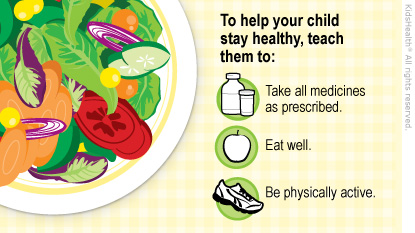HIV (human immunodeficiency virus) weakens the body's immune system (germ-fighting system). There is no cure, but most people can control the virus with medicines and live a healthy life.


Help Your Child Stay Healthy
Prevent the Spread of HIV

Your child:

Your child:

How do people get HIV? HIV can pass from mother to child during pregnancy, childbirth, or breastfeeding. People also get HIV from being stuck with an infected needle.
In teens, HIV spreads mainly through sex (especially anal and vaginal) and sharing needles for injecting drugs or tattooing.
You can't get HIV from hugging or holding hands with someone who has HIV.
How does HIV cause illness? HIV destroys germ-fighting cells in the body called CD4 cells (or T cells). Over time, as HIV kills off more CD4 cells, people with HIV can get infections and other health problems. If the number of CD4 cells gets very low or people have serious infections, HIV becomes AIDS (acquired immune deficiency syndrome). It can take many years for someone with HIV to develop AIDS.
What are the signs of HIV? For the first few years after getting HIV, many people have no signs. Some may have swollen glands or a rash. As the immune system weakens, people with HIV can have fever, stomach pain, vomiting, diarrhea, weight loss, and serious infections.
How is HIV treated? Health care providers prescribe medicines to help keep the number of CD4 germ-fighting cells high and reduce the viral load (how much HIV is in the body). People with HIV need regular blood tests to find out how many CD4 cells they have and how much HIV is in the body.